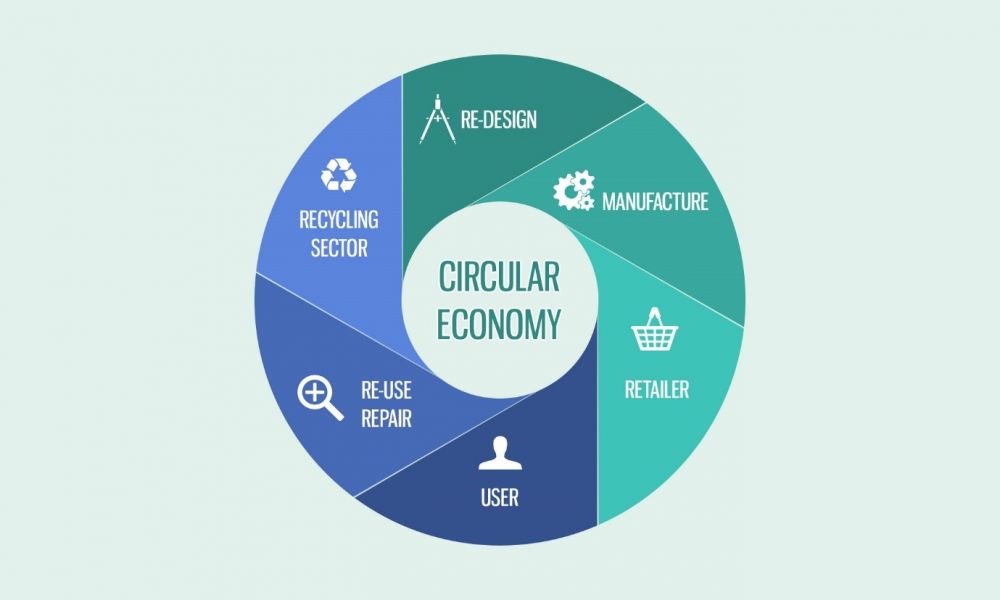Since the arrival of industrialization, our economy has been resting on a linear model; we manufacture things, use them, and then discard. Circular economy means a system in which waste is largely eliminated at the end of a product’s life, component materials become resources to be used in new goods and services. Research into circular economics includes the use of secondary resources such as plastics, food waste, building and demolition waste, biomass and metals.
Transitioning to a circular economy does not only amount to adjustments aimed at reducing the negative impacts of the linear economy. Rather, it represents a systemic shift that builds long-term resilience, generates business and economic opportunities, and provides environmental and societal benefits.
From economic front, circular economy is gaining traction due to the promising growth numbers projected that could potentially be an immense gain if reached. Research conducted by the Ellen MacArthur Foundation, Foundation for Environmental Economics and Sustainability (SUN) and consultancy firm McKinsey have identified that transitioning to a circular economy could generate a net economic gain of $2.2 trillion per year by 2030 in Europe alone.
Asia, the manufacturing centre of the world, sees the opportunity for the circular economy is massive. While the concept has been around for decades, what make it “so ripe for widespread adoption now” are the disruptive digital technologies that allow massive change.
And here comes the new economic model. Take Indonesia’s AQUA as a good example So popular in Indonesia, the AQUA name had also become the generic term for bottled water nationwide.
AQUA’s parent company, Danone, has announced new commitments and actions to ensure its packaging will become 100 percent circular and to accelerate the global transition toward a circular economy of packaging. The company will develop alternative delivery models or new reuse models where relevant and take action to eliminate problematic or unnecessary plastic packaging.

AQUA is also aiming at direct engagement with consumers to increase recycling rates, through a new movement titled “#BijakBerplastik,” or “Be Plastic Wise.” Through this movement, AQUA commits to support pioneering technologies & social business programs to clean plastic waste from the environment, to make its entire package 100% reusable, recyclable and compostable products by 2025, while increasing the proportion of recycled plastic in the bottles from 11% to 50% by 2025, and to expand its school program to reach 5 million kids and lead campaign in recycling education, and to activate consumer awareness recycling programs targeting 100 million consumers by 2025.
As for AQUA, it unveiled the Indonesia's first 100% recycled plastic and 100% recyclable bottle during the “2018 Our Ocean Conference in Bali” , as part of its commitment to helping reduce plastic pollution in the archipelago.
AQUA is also aiming at direct engagement with consumers to increase recycling rates, through a new movement titled “#BijakBerplastik,” or “Be Plastic Wise.” It rolls out recycling drop boxes that will offer shoppers to get local phone top-up credit in exchange for returning used plastic bottles. AQUA also places drop boxes at mini marts locations nationwide, hoping to make the program available to 100 million people by 2025.
AQUA Pledges to recover more plastic than it uses in Indonesia, including through interception of marine littering. It has also committed to increasing the average amount of recycled plastic in its bottles to 50% by 2025, and will directly use much of this recovered plastic.
Circular economy offers a triple win; social, economic and environmental. Besides reducing plastic waste and environmental degradation, it increases competitiveness, creates jobs and helps switch to a green economy. It leads to a truly sustainable economic development. But, companies cannot create a circular economy on their own, and relevant stakeholders have an important role to play.
That is why, cross-collaborations is extremely important. Whether the circular economy will work depends largely on consumers. We, as consumer is one of the most significant contributor to this transitional process towards circular economy. We can support businesses practicing circular principles by promoting this good practices, buying from them, and cooperate in closing the loop.
In technical front, we can act as the waste collectors which are an essential element of the circular economy value chain. There are already numerous platforms established for consumers to drop off empty plastic bottles to be recycled.



















